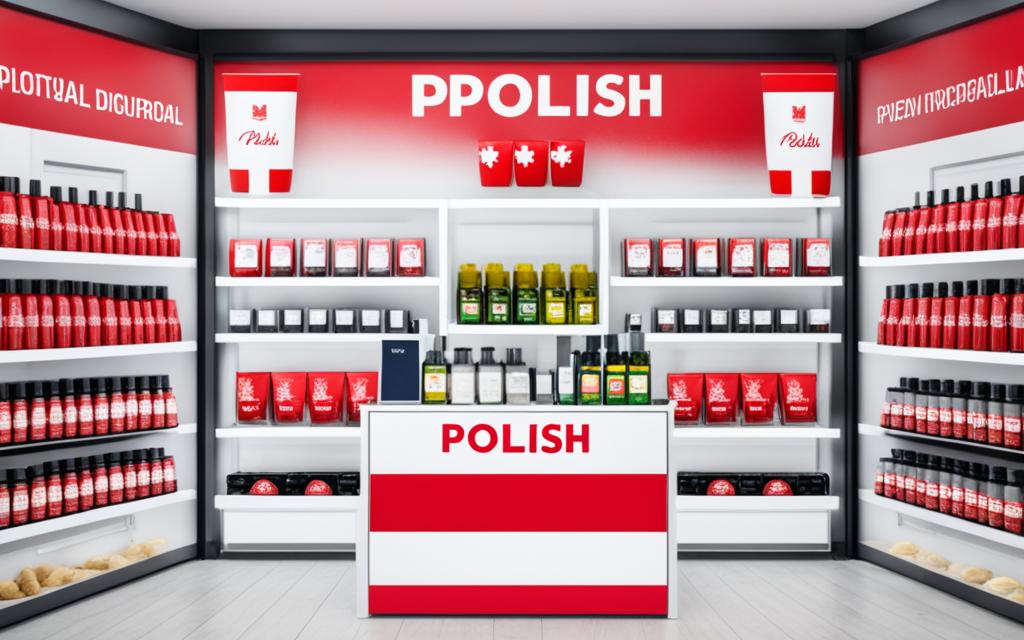Welcome to our comprehensive guide on starting an E-Commerce business in Poland. As one of the fastest-growing markets in Europe, Poland offers great opportunities for entrepreneurs looking to venture into the world of online retail. In this section, we will explore the latest market trends and highlight the legal requirements you need to be aware of when launching your E-Commerce business in Poland.
Before diving into the specifics, let’s take a look at the E-Commerce market in Poland. With a population of over 38 million internet users, the Polish market presents a vast consumer base ready to embrace online shopping. The E-Commerce sector has experienced significant growth in recent years, with a steady increase in online sales and consumer trust in online transactions.
Understanding the market trends and online shopping habits of Polish consumers is crucial for success in this competitive landscape. By catering to their preferences and delivering an exceptional user experience, you can position your E-Commerce business for success.
However, it’s important to note that along with the exciting growth opportunities, there are legal requirements that you need to navigate when establishing your E-Commerce venture in Poland. From company registration to tax obligations, complying with the relevant regulations is essential to operate within the law and build a trustworthy brand.
In the following sections, we will delve deeper into the market trends, legal requirements, website development, marketing strategies, and employment regulations specific to E-Commerce businesses in Poland. Whether you’re a budding entrepreneur or an established business owner looking to expand into new territories, this guide will provide you with the information you need to succeed in the Polish E-Commerce landscape.
Understanding the Polish E-Commerce Market
Welcome to the second section of our comprehensive guide to starting an E-Commerce business in Poland. In this section, we will provide you with valuable insights into the Polish E-Commerce market so that you can make informed decisions for your business.
Poland’s E-Commerce market has experienced significant growth in recent years, offering immense opportunities for online businesses. With a population of over 38 million internet users, Poland has become a prime destination for E-Commerce entrepreneurs.
The market trends in Poland reveal a thriving online shopping industry with a strong focus on convenience, affordability, and a wide range of product offerings. Polish consumers have embraced online shopping with open arms, and their habits and preferences continue to evolve with the changing digital landscape.
Understanding the online shopping habits of Polish consumers is essential for tailoring your business strategies to meet their expectations and drive sales. Polish shoppers value fast and secure delivery options, easy returns and exchanges, competitive prices, and personalized customer experiences.
As you navigate through the Polish E-Commerce market, it is important to stay updated with the latest market trends and insights. This knowledge will help you position your business effectively, identify new opportunities, and stay ahead of the competition.
Now that you have a glimpse into the Polish E-Commerce market and the online shopping habits of Polish consumers, let’s move on to the next section, where we will dive deep into the legal requirements for E-Commerce businesses in Poland.
Legal Requirements for E-Commerce Businesses in Poland
When starting an E-Commerce business in Poland, it is crucial to understand and comply with the legal requirements and regulations that govern online businesses in the country. From company registration to tax obligations, adhering to these rules will help ensure a smooth and legally compliant operation.
Company Registration
Prior to launching your E-Commerce venture in Poland, it is necessary to register your company with the relevant authorities. The specific registration process may vary depending on the legal structure you choose, such as a sole proprietorship or a limited liability company (sp. z o.o.). Consult with a legal professional or a business advisor to determine the most appropriate legal entity for your E-Commerce business.
During the registration process, you will need to prepare the necessary documents, including identification and proof of address for all company shareholders or directors. You may also be required to provide a business plan outlining your E-Commerce business model and financial projections.
Tax Obligations
As an E-Commerce business owner in Poland, you must fulfill your tax obligations to maintain compliance with the country’s tax laws. This includes registering for value-added tax (VAT) if your annual turnover exceeds the threshold set by the authorities, which is currently PLN 200,000 (approximately £40,000).
Additionally, you will need to keep accurate records of your financial transactions, including sales, expenses, and VAT payments. Regular reporting and submission of VAT returns are essential to remain compliant with Polish tax regulations.
Specific Regulations for Online Businesses
In addition to company registration and tax obligations, there are specific regulations that apply to online businesses in Poland. These regulations aim to protect consumers and ensure fair business practices in the E-Commerce sector.
For example, your E-Commerce website must prominently display terms and conditions, privacy policies, and return policies to provide transparency to your customers. You may also be required to obtain necessary licenses or permits for specific product categories, such as food or pharmaceuticals.
By understanding and fulfilling the legal requirements for E-Commerce businesses in Poland, you can establish a solid foundation for your online venture. Partnering with legal professionals or business advisors with expertise in Polish law can help ensure that you navigate the legal landscape with confidence and avoid any potential legal issues or penalties.
Building Your E-Commerce Website
In today’s digital age, having a strong online presence is crucial for the success of your E-Commerce business in Poland. A well-designed website can not only attract customers but also enhance their overall shopping experience. In this section, we will guide you through the process of building a successful E-Commerce website for the Polish market.
When it comes to website development, user experience is key. Polish consumers value convenience and simplicity, so it’s important to create a website that is easy to navigate and offers a seamless shopping experience. Consider implementing clear categories, intuitive search functions, and a streamlined checkout process to maximize user satisfaction.
Mobile optimization is also a vital aspect to consider when designing your E-Commerce website. With the increasing popularity of smartphones in Poland, a mobile-friendly website is a must. Ensure that your website is responsive and displays properly on different screen sizes, allowing customers to browse and make purchases effortlessly on their mobile devices.
Tips for designing a website that resonates with Polish consumers:
- Use high-quality images: Visuals play a significant role in capturing the attention of Polish consumers. Incorporate appealing product images and well-designed graphics to enhance the visual appeal of your website.
- Offer multiple payment options: Polish consumers prefer diverse payment options, including online transfers and popular payment gateways. Providing a range of secure payment methods can boost customer trust and increase conversion rates.
- Include customer reviews and ratings: Polish consumers rely heavily on social proof when making purchasing decisions. Incorporate customer reviews and ratings on your website to build trust and credibility.
- Integrate social media sharing: Polish consumers are active on social media platforms, and word-of-mouth recommendations hold great influence. Implement social media sharing buttons on your product pages to encourage customers to share and promote your products.
By following these tips and considering the preferences of Polish consumers, you can create an engaging and user-friendly E-Commerce website that effectively caters to the Polish market. Providing a seamless shopping experience and optimizing your website for mobile devices will give your business a competitive edge and help drive customer satisfaction and sales.
Implementing Effective Marketing Strategies
To successfully promote your E-Commerce business in Poland, it is crucial to implement effective marketing strategies. In this section, we will explore key tactics that can help you reach and engage Polish customers.
Social Media Advertising
Social media platforms play a significant role in the lives of Polish consumers. To effectively target this audience, consider running social media advertising campaigns. Platforms like Facebook, Instagram, and Twitter offer robust targeting options, allowing you to reach specific demographics and interests relevant to your business. Craft compelling ad copy and visually appealing creatives to capture the attention of potential customers.
Search Engine Optimization (SEO)
Optimizing your E-Commerce website for search engines is essential to increase visibility and drive organic traffic. Conduct thorough keyword research to identify relevant terms and incorporate them strategically in your website’s content, meta tags, and URLs. Focus on providing high-quality, informative content that aligns with customer search intent. Additionally, improve your website’s load speed, usability, and mobile responsiveness for a better user experience.
Content Marketing
Creating valuable content related to your product or industry can help establish your E-Commerce business as a trusted authority. Develop a content marketing strategy that includes producing blog articles, videos, infographics, and guides that resonate with your target audience. Share this content across your website, social media platforms, and email newsletters to drive engagement and build brand loyalty.
- Regularly update your blog with informative articles that address customer pain points or provide expert advice.
- Create engaging videos to showcase your products, share tutorials, or offer behind-the-scenes glimpses of your business.
- Design visually appealing infographics that simplify complex information and make it shareable across social media platforms.
- Develop comprehensive guides that serve as resources for your customers, positioning your business as a knowledgeable industry leader.
Influencer Marketing
Partnering with influential individuals or bloggers in your industry can help amplify your E-Commerce brand’s reach. Identify relevant influencers who have a strong following and align with your target market. Collaborate with them to promote your products or services through sponsored content, reviews, or endorsements. This can help increase brand awareness and generate valuable word-of-mouth recommendations.
By implementing these marketing strategies, you can boost the visibility and success of your E-Commerce business in Poland, reaching and engaging with your target audience effectively.
Polish Employment Regulations for E-Commerce Businesses
When establishing an E-Commerce business in Poland, it’s crucial to have a clear understanding of the country’s employment regulations and labor laws. Complying with these regulations not only ensures legal compliance but also fosters a positive and productive work environment for your employees.
Polish labor laws dictate various obligations for employers, such as registering your employees with the appropriate authorities, setting up employment contracts, and determining the correct salary and benefits packages. It’s vital to familiarize yourself with these obligations to avoid any legal issues and maintain a harmonious employer-employee relationship.
Additionally, Polish law mandates the provision of specific employee benefits, which includes paid leave, health and safety regulations, and social security contributions. These benefits are designed to protect and support the welfare of your employees, promoting employee satisfaction and loyalty.
By understanding and adhering to Polish employment regulations, you can ensure that your E-Commerce business operates within the legal framework and contributes to a fair and equitable working environment for all.














